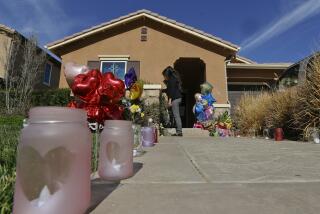Father Was Wrong--but Was County Right?
- Share via
The first time the father called to complain that his 5-year-old son had been kept in Orangewood Children’s Home for a week, I put it on the back burner. Likewise, after he’d been there a second week. After all, Mohammad Bakhtiari had told me upfront that he’d struck his son with an open hand, leaving red marks on the boy’s face. That’s not a good way to gain my sympathy.
But by the time Bakhtiari’s son had been in Orangewood a third week and then a fourth, and Bakhtiari was still calling--sometimes crying in frustration--I listened more closely.
Time and again, Bakhtiari, a 35-year-old Orange resident and a technician with Boeing, posed these questions: What is the proper punishment for a first-time offending parent who strikes a child? More important, what is the impact on a 5-year-old, kept away for a month from day-care school and friends and the only parent with whom he has regular contact? Bakhtiari said he also asked Social Services to release his son to Bakhtiari’s brother, who also lives in Orange and is married with two children, and to interview longtime friends, neighbors and teachers about Bakhtiari’s behavior and personality. All to no avail.
That’s why I decided to tell Bakhtiari’s side of the story.
On the night of Dec. 8, Bakhtiari’s son and the 2-year-old daughter of his live-in nanny were playing, with Bakhtiari seated nearby at his desk. When the boy pushed the little girl, making her fall, Bakhtiari said he lashed out with his open hand, striking his son, who was standing next to him, in the face. Bakhtiari told me he rarely spanks his son and had never before hit him in the face.
I asked Bakhtiari, who also goes by “Mike,” if he thinks a parent has a right to strike a child in the face. “Of course not,” he said. Did you overreact? I asked. “Of course I overreacted,” he said. “I made a mistake. I’m a human being. I shouldn’t have done it. I would never do it again. I love my son dearly. He’s the most important thing in my life. They’re making a mountain out of a molehill. The punishment I have received and he’s received by being locked up in that place for 30 days is far worse than what I could have possibly ever done.”
*
The legal ball began rolling the next day, when a teacher at the boy’s school saw his discolored facial marks. As required by law if parental abuse is suspected, the school notified authorities. An Orange Police Department officer interviewed the boy, and later that afternoon, Bakhtiari was in county jail and his son in Orangewood.
The boy “was reluctant to tell me what happened,” the officer wrote in his report. “At first he told me that he had fallen and hit his head. I asked [him] if his father had caused the bruises. He changed his story and told me his father did, in fact, cause the bruises. He told me yesterday he was playing and fell. His father came over to him and ‘spanked’ him across the right side of his face. The spank hurt, caused him to fall again, and he began to cry. He then went to bed. He later hugged his father and everything was better.”
The police report continued: “I asked [him] if his father had ever spanked him before. He told me he did. I asked [him] if his father had ever spanked him across the face before. He told me this was the first time he was spanked in the face. He went on to say that all the other times he was spanked, he was spanked on the bottom. I asked [him] if his father spanks him a lot. He told me that he did not.”
I contacted Kathy Haines, director of the day-care school Bakhtiari’s son attends. She didn’t think it was appropriate to pass judgment on the situation, because the teacher who reported the incident may have to testify.
Haines said, however, that no one at the school is second-guessing the decision to notify authorities. She said teachers had never noticed marks on the boy before and, stressing that she wasn’t taking sides, added: “We’re just devastated about [the boy], about where he is and that he’s not here. We love him to death.”
*
Last week, just short of 30 days at Orangewood, Bakhtiari’s son was released to his mother’s custody. She and Bakhtiari were divorced four years ago, and Bakhtiari has had sole custody. His ex-wife has visited only periodically the last four years, Bakhtiari said.
Yvette Aguayo, the Social Services investigator on the case, didn’t return my phone call to her. I told Bakhtiari that the county would argue it protected his son by keeping him away from a potentially dangerous parent. How could social workers know that he hadn’t slapped his son before or would do it again? I said to Bakhtiari.
“Let me turn it around,” he said. “What if I’m a very nice person? If they want to play the what-if game, I have a list of friends, co-workers, acquaintances, neighbors. This is what makes me crazy: They’re refusing to interview people who know me. If they want to play the what-if game, why not go talk to people who know me?”
*
I contacted Gary Mooers, whose family lives a few doors from Bakhtiari and whose daughter is the same age as Bakhtiari’s son and often plays with him. Mooers, a trainer and recruiter for a health care company, said he and his wife tried at least three times to visit the boy at Orangewood but never got return phone calls from authorities.
“We wanted to go for the good of [the boy], figuring he would feel good having the comfort of our familiar faces,” Mooers said.
Mooers said his wife drove Bakhtiari’s son and their daughter to school for a year, when the children were 4, and never saw any suspicious marks on him. “I’ve never seen Mike physical with his son, ever. All I’ve seen is love between him and his son.”
Mooers conceded it was unsettling that Bakhtiari had struck his son in the face. “Frankly, for the school to see marks, he must have slapped him pretty hard. The only other thing I can say, though, is that it was the first time around for Mike. For him to be separated and for his son to be separated from his family for this long of time, [Social Services has] just gone overboard.”
Eugene Howard, a former director of the county’s Children’s Services and now director of Orangewood’s fund-raising arm, said Bakhtiari is asking the wrong questions about Orangewood, which took in about 3,000 children last year.
“The fact of the matter is, Orangewood is there to provide protection for children who are placed there through Social Services and the court process,” said Howard, who was not familiar with the Bakhtiari case. “His questions should be, why was the child removed from the home, what were the issues related to that removal, what were issues that required that removal, and were those issues sufficient to warrant removal?”
*
I asked Howard what happens to a child during such a lengthy stay. “Orangewood is a good facility that provides excellent care, where [children] receive counseling and loving support. If they’re of school age, they go to school. No one would argue that Orangewood takes the place of a loving, well-functioning family. Obviously, the best place for a child is in a good family, but if they can’t be for whatever reason, Orangewood tries to be the best possible substitute until issues are sorted out.”
I asked Bakhtiari why Social Services would keep his son at Orangewood, unless the agency genuinely believed he might be in danger. Bakhtiari says a Social Services official repeatedly told him they feared he would flee with his son to his native Iran, which he left with his family when he was 11.
*
During one of our conversations, Bakhtiari sounded especially frustrated. “You know why I’m jumping out of my skull?” he said. “I was in the U.S. Air Force for 11 years. I worked on some of the most secret airplanes in the U.S. air inventory--SR-71, U-2 and the KC-135. The U.S. government could trust me with very secret programs and [was] sure I wasn’t going to get up and go to Iran and take these secrets with me, yet the Department of Social Services--and this is where I think they’re so nuts--they think I’m going to take my son and go to Iran. Even though I’ve worked for Boeing for 12 years. I have no life in Iran.”
Bakhtiari has a court hearing this week on misdemeanor charges of child abuse. He has been attending parenting classes set up by the county but says he’d put more stock in them if the instructor hadn’t revealed that he’s neither married nor a parent.
Bakhtiari still thinks spanking is appropriate on occasion. Since he admits the error in slapping his son, he says he has no other lesson to learn. “I’m not saying that you shouldn’t go after abusers. I think you should put your efforts into getting these people, but not every parent who one time spanks his child across the face and is regretful and remorseful that it happened.”
*
Meanwhile, the Mooerses question the protracted separation between father and son, especially because of its possible impact on the boy. “As a citizen, it really concerns me that Social Services has such control,” Gary Mooers said. “I used to be the other way: Good for Social Services, those people who beat up their kids have no right being with them. This is the closest I’ve been to a real situation, and I’m shocked and appalled, frankly. It’s almost like the IRS. It’s like they have no accountability to anybody, it appears to me.”
Bakhtiari says the slap has had one other effect: “I swear to you it has taken me eight years to put away $10,000 for my son for his college education. This incident has cost me $12,500. That’s my only savings, and I have to take it out my child’s college education to pay for a lawyer. That’s [Social Services’] greatest injustice of all.”
*
Dana Parsons’ column appears Wednesday, Friday and Sunday. Readers may reach Parsons by calling (714) 966-7821, by writing to him at The Times Orange County Edition, 1375 Sunflower Ave., Costa Mesa, CA 92626, or by e-mail at dana.parsons@latimes.com.
More to Read
Sign up for Essential California
The most important California stories and recommendations in your inbox every morning.
You may occasionally receive promotional content from the Los Angeles Times.













